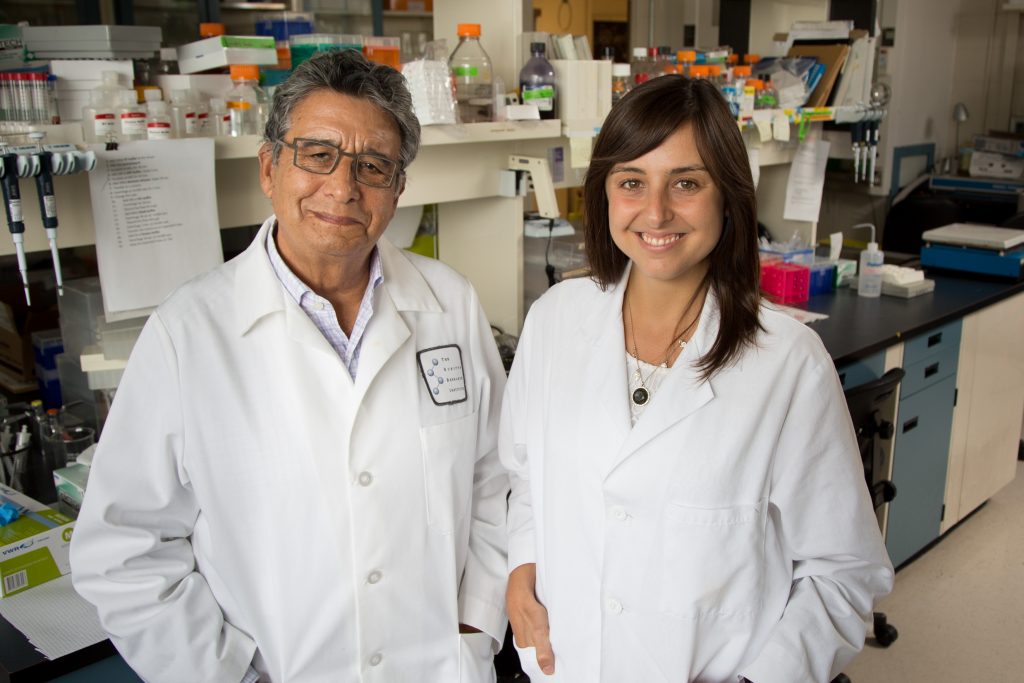
By Sophia Blankenhorn, Medicine Focus
How did an Alzheimer’s researcher come to earn an international award for best Down syndrome thesis?
Florencia Iulita, PhD’14, recipient, this June, of an Annette Karmiloff-Smith Award for Outstanding PhD Thesis, explains.
Early in her doctoral studies, her supervisor, fellow native Argentinian, Dr. A. Claudio Cuello, Charles E. Frosst Merck Chair, and former Chair, Department of Pharmacology & Therapeutics, approached her with a surprising suggestion: “He said, let’s study Down syndrome, and I thought, what could that have to do with Alzheimer’s disease?”
The link would prove interesting.
“If you examine the brain of a person with Down syndrome at forty or fifty years of age, you will not be able to distinguish it from that of a seventy year old with Alzheimer’s: It is virtually identical,” says Iulita.
People with Down syndrome have a high risk of developing Alzheimer’s disease because they have three chromosome 21s, “and in that extra chromosome, an extra copy of a gene that predisposes them to the disease.” From the time they are born, a protein called amyloid-beta starts to accumulate in the brains of people with Down syndrome. This same protein also builds up in the brain of Alzheimer’s individuals.
And so Iulita set out to investigate Down syndrome, as a novel way to learn more about early Alzheimer’s disease.
Alzheimer’s has a long incubation or “silent period” before full-blown dementia manifests. By the time there are symptoms, the damage is already irreversible. For a treatment to be effective, it would also need to be coupled with a method for earlier diagnosis.
Previous studies from the Cuello lab had shown an impairment in nerve growth factor (NGF) metabolism in Alzheimer’s brains. Iulita discovered the same mechanism at work in the case of Down syndrome. This means that NGF dysmetabolism could be present in early Alzheimer’s.
“It also strengthens the link between Alzheimer’s and Down’s in terms of common pathological mechanisms,” says Iulita, who credits her success—and her award, from the Trisomy 21 Research Society—to the strength of her relationship with mentor Cuello. “He let me be independent from the moment I joined the lab, even when I was sometimes unsure of what I was doing. He was setting the backstage for me to grow as a scientist.”
Another key to her success was the use of the McGill Alzheimer’s rat, a transgenic rat model developed by Cuello and collaborators for investigation of early and late stages of Alzheimer’s pathology.
“One angle researchers are actively exploring is the development of biomarkers,” she says. “Could we detect these changes in NGF metabolism in body fluids?”
In an effort to answer this question, Iulita examined plasma blood samples collected from people with Down syndrome. Changes detected in the brain were also evident in plasma.
“The measures of these molecules actually predicted future decline in cognition of the patients we were following. We are seeing a lot of changes in the brain that happen before full-blown cognitive deficits,” say Iulita.
After spending an additional year in the Cuello lab, Iulita is now pursuing a second postdoctoral fellowship, at Université de Montréal, where her focus is on how vascular risk factors such as hypertension and arterial stiffness contribute to dementia.
Eventually, though, Iulita would like to re-incorporate a focus on Down syndrome into her research on Alzheimer’s, and to lead her own lab exploring the connection between Down syndrome and vascular contributions with Alzheimer’s.
“I always wanted to do something medical, to have an impact on patients. Studying Down syndrome gives us the chance to improve care for people with trisomy and at the same time to better understand Alzheimer’s,” says Iulita, who hopes to stay in Montreal—where she has made a home away from home—and where she feels that she can make a real contribution, filling a gap in Down syndrome research and shedding light on Alzheimer’s.
September 13, 2017
